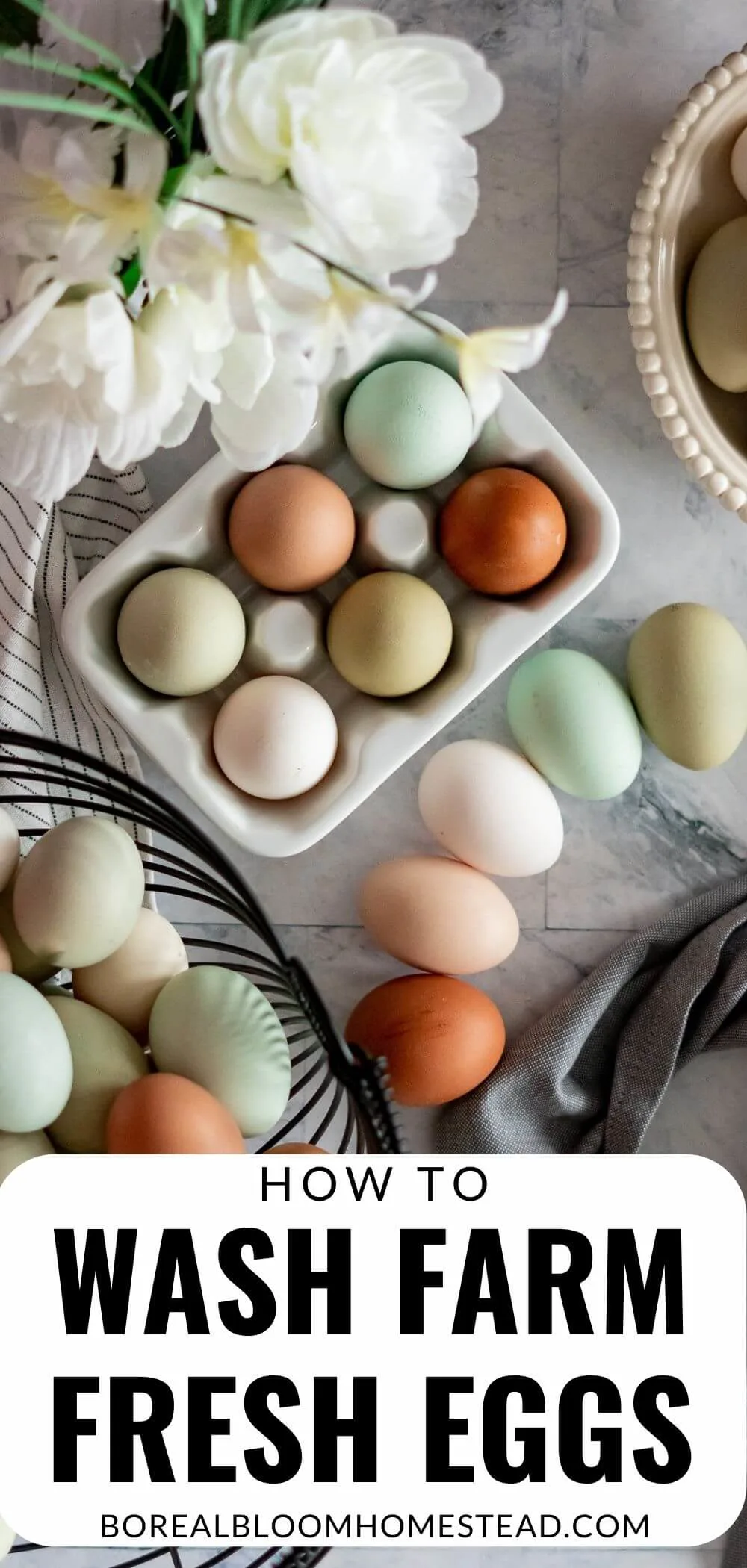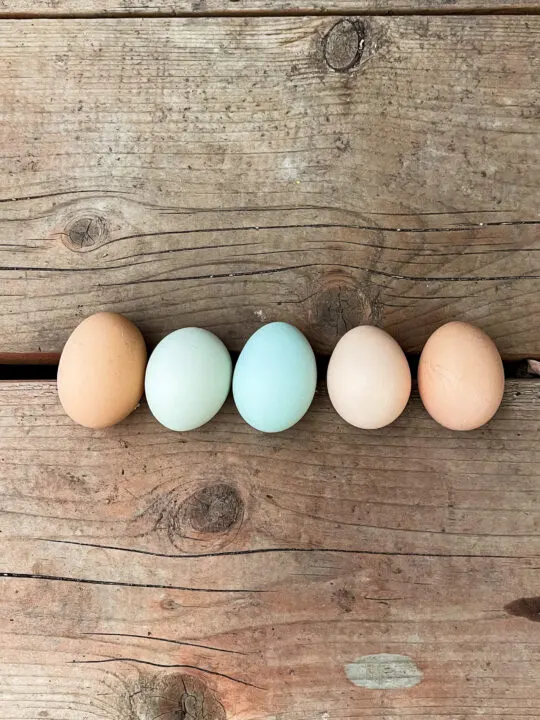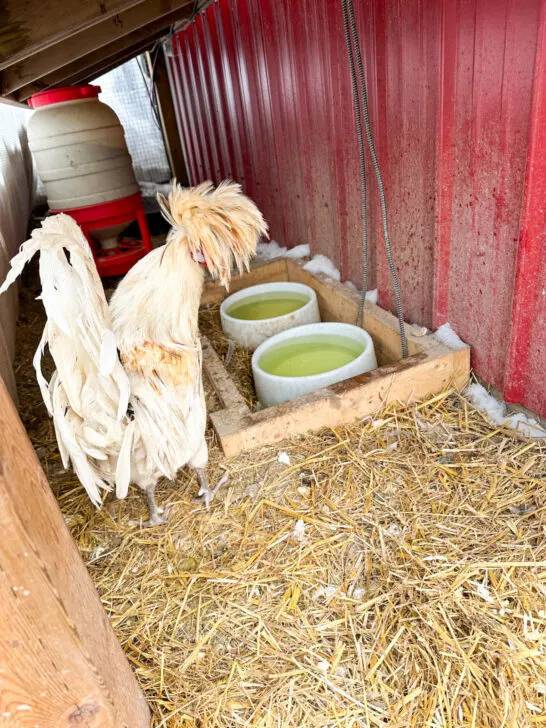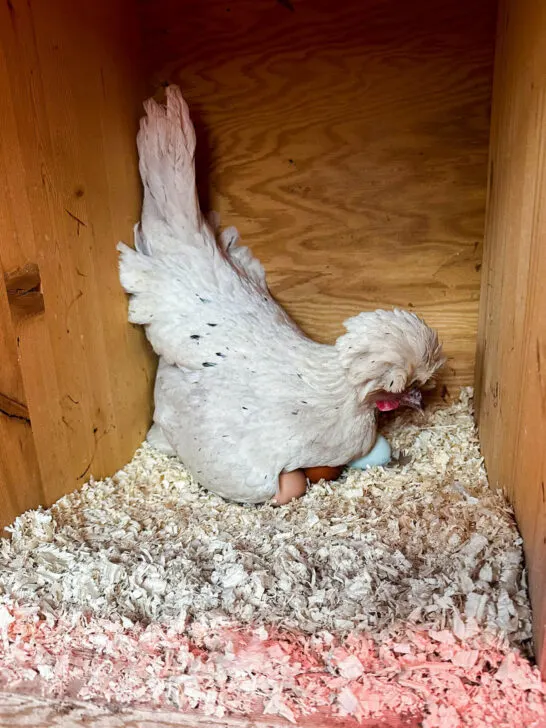Learn how to wash fresh eggs from your backyard chickens or homestead hens, the importance of storage, and how to keep eggs clean, starting at the coop.
So you've got your fresh eggs... Now what??
As a backyard flock owner, farmer, or homesteader, there is no greater joy than collecting your egg bounty. It's exciting to open up that nesting box each day!
But what happens when it's time to clean those delicious eggs? Have you ever stopped to consider if there are certain techniques for keeping them healthy while they go from farm-fresh to kitchen-ready?
After all, you want every single one of those eggs you, and your hens, worked so hard for to make it safely onto your plate!
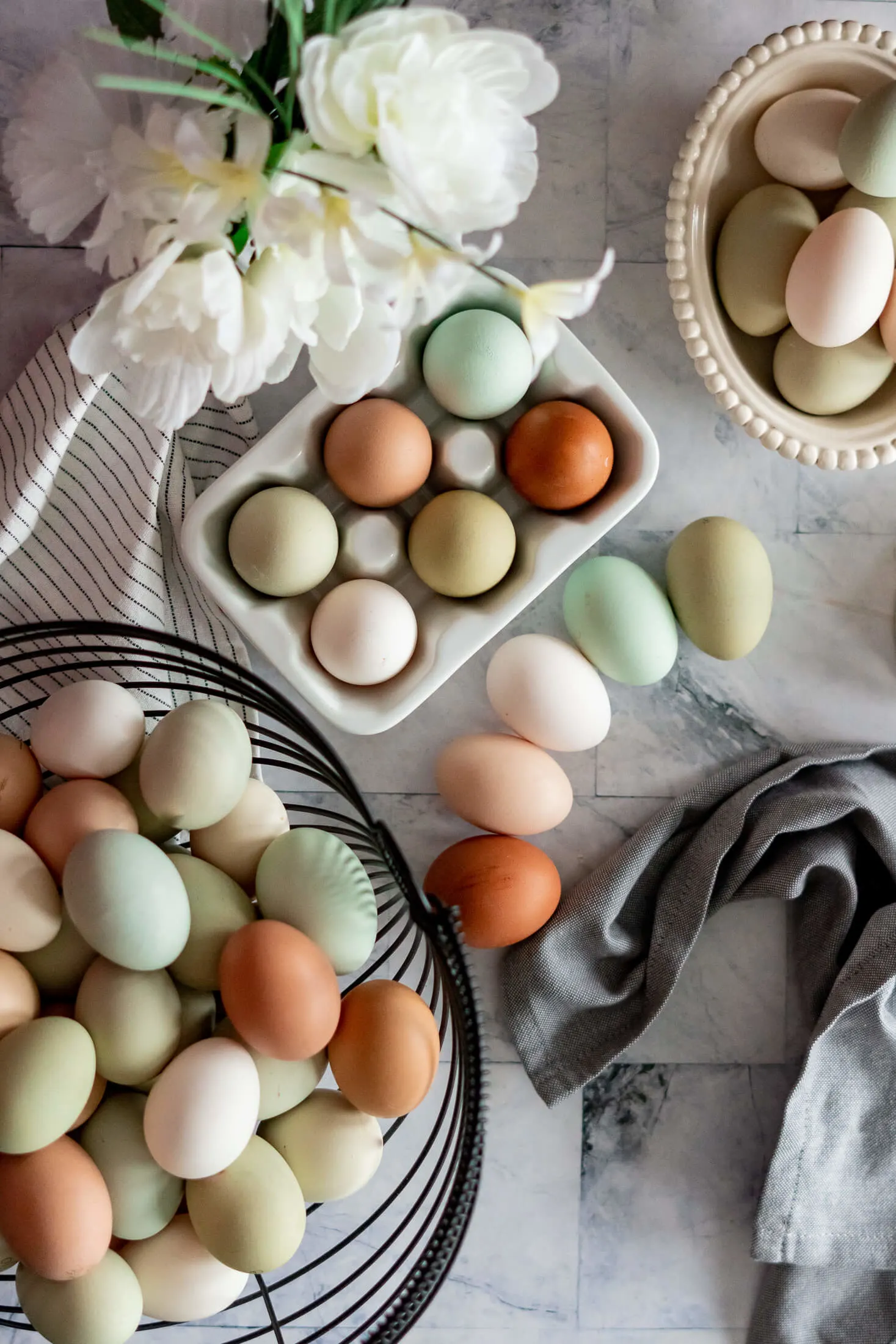
As an Amazon Associate I earn from qualifying purchases.
Love video content? I have a great video on YouTube covering how to wash fresh eggs!
Jump to:
Do Fresh Eggs Need To Be Washed?
Undoubtedly, yes.
Eggs ALWAYS need to be washed before being consumed. Washing farm fresh eggs or backyard flock eggs helps to remove debris, dirt, and bacteria that can accumulate on the shells. Even if you collect them fresh from the nest, there is still a chance of contamination that could lead to foodborne illness.
Besides, chickens are dirty! They poop everywhere, ALL, the time. They bathe in dirt. They don't wear shoes. It's highly conceivable that your favorite chook stepped in poop or dirt before she jumped into the nesting box. That alone could contaminate her egg. Or the egg her friend laid minutes before she jumped in.
Store bought eggs do not require washing if you're in the United States or Canada as they have been washed prior to being distributed to the stores. If you're purchasing uninspected eggs at a farmers market or from a friend, it's always a good idea to ask if the eggs are unwashed or washed at the time of purchase.
In European countries, the laws state that eggs must not be washed prior to distribution to consumers. This creates a lot of confusion for us North Americans!
Here is one thing to consider, European shopping culture is different from ours - they generally grocery shop more often, and in smaller increments, than we do. The smaller purchase quantities, quicker turnover of those eggs, and more frequent restocking can help to explain why buying eggs with a 3-week shelf life is perfect for them!
The egg-washing debate arises around when to wash eggs.
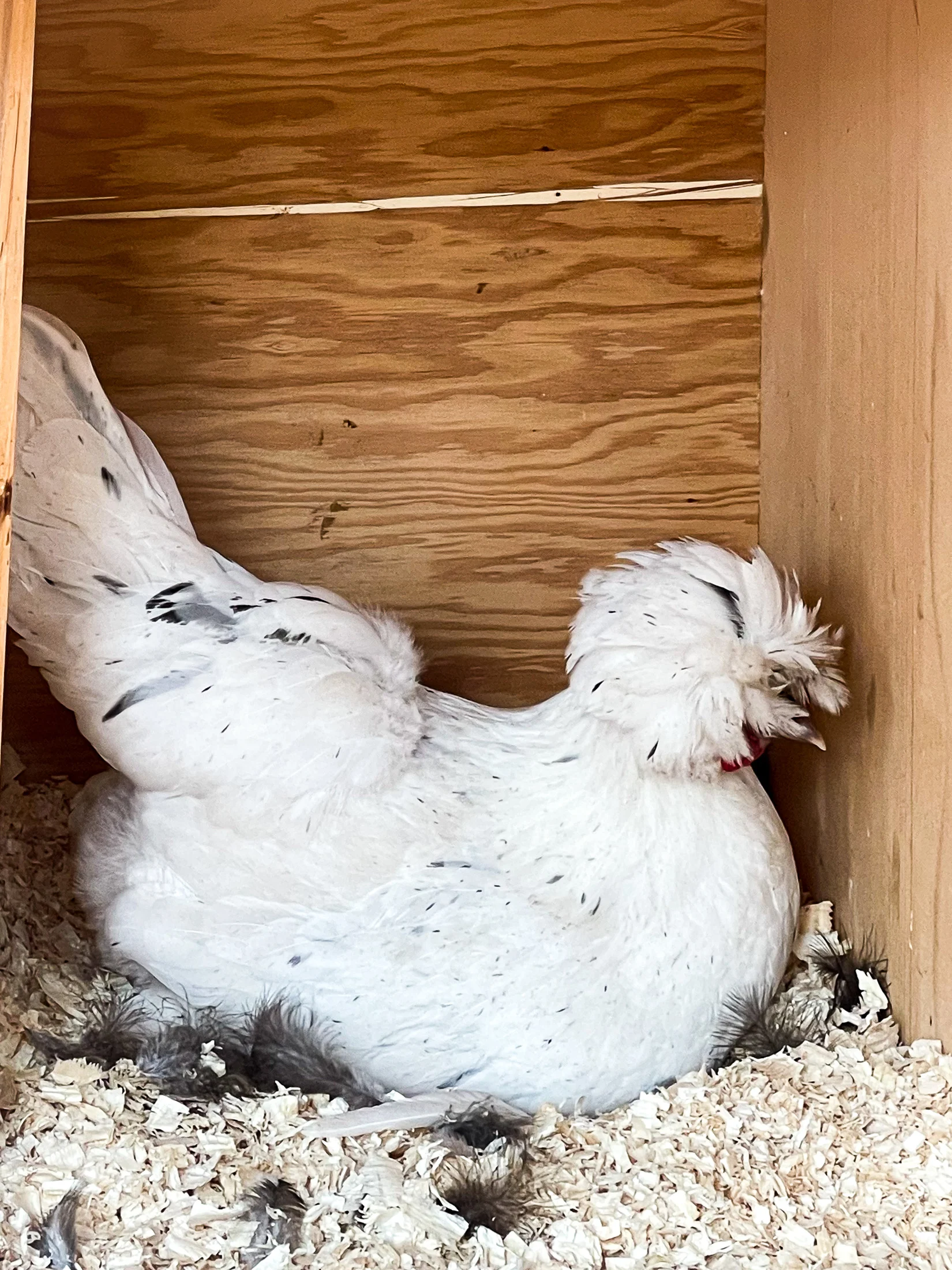
When To Wash Fresh Eggs?
This is a real hot-button topic in chicken-keeping groups! (I'm looking at you, Facebook!)
Some advocate for washing after collection and others advocate for not washing until immediately prior to use. Both sides think they are right - but my opinion falls somewhere in the middle, and yours should too!
First, it's important to know that chicken eggs are coated by a shell made of calcium carbonate crystals, which explains why laying hens need calcium supplements, but I digress! These shells are naturally porous, which means they have minute, microscopic holes that allow both liquid and gas exchange in and outwards.
Unwashed, freshly laid eggs have what's known as a bloom or cuticle which is a natural, invisible protective layer on the shell of the egg. It is deposited by the chicken as it passes through the reproductive tract. This bloom helps to seal and protect the egg from bacteria entering through the pores of the shell as well as reducing moisture loss from the egg. An egg's bloom helps to naturally preserve it for longer.
These eggs, with the bloom intact, can actually be kept unwashed, at room temperature for up to 3 weeks! But this process comes with a caveat: only clean eggs should be left unwashed at room temperature for any length of time, if necessary, you can 'dry clean' these eggs by gently wiping them with a clean cloth to remove feathers or bedding. Dirty eggs should be either washed and refrigerated or discarded. Cracked eggs should be discarded as the cracked shell may allow bacteria inside the eggs.
Freshly laid eggs that have been properly washed MUST be stored in the fridge, but this process helps to improve their shelf life 5 fold. Yup - washed, freshly laid eggs can last up to 15 weeks in the fridge! The washing process, even simply splashing with water, removes the bloom from the egg, and once the bloom has been removed it is no longer fit to be stored at room temperature.
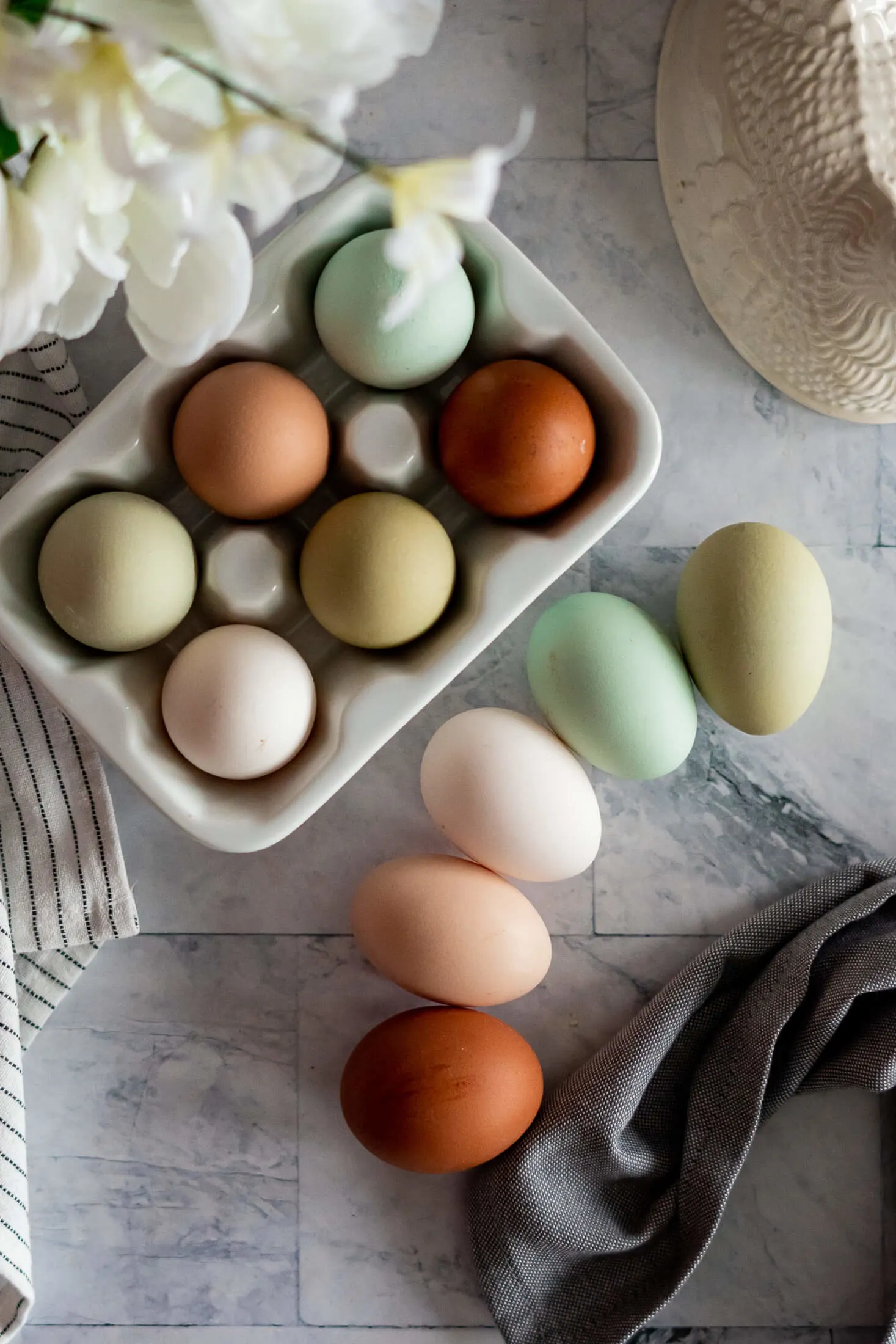
How To Ensure Clean Eggs
Regardless of your stance on washing eggs, it's important to ensure you've got clean eggs right up front. There are a few great ways to ensure the eggs you collect are free of dirt, debris, and bacteria as soon as they land in the nesting box!
Clean eggs start with your chickens, purchasing healthy hatching eggs, chicks, or chickens from reputable breeders or providers can ensure they stay healthy. Keeping the chicken coop and nesting boxes clean is vitally important to their health. Healthy birds are less likely to shed bacteria on eggs and in their environment.
The next critical component is egg management. There are a few small things you can do as a chicken tender to ensure clean eggs.
- Collect the eggs at least twice a day - the more often they are collected, the more likely you'll have cleaner, fresher eggs with a reduced chance of contamination and cracked or broken eggs.
- Keeping the nesting boxes clean by removing debris and not allowing the chickens to sleep or hang out in the boxes unless they are laying is another great way to improve the likelihood of clean eggs.
- Collect eggs in two separate containers. One for clean eggs without dirt or debris and one container for dirty eggs, this helps to reduce contamination between dirty and clean eggs right at the coop.
- Wash your hands prior to collecting and handling eggs to avoid transferring unwanted germs to your fresh eggs. Don't forget to wash your hands after handling fresh unwashed eggs as well.
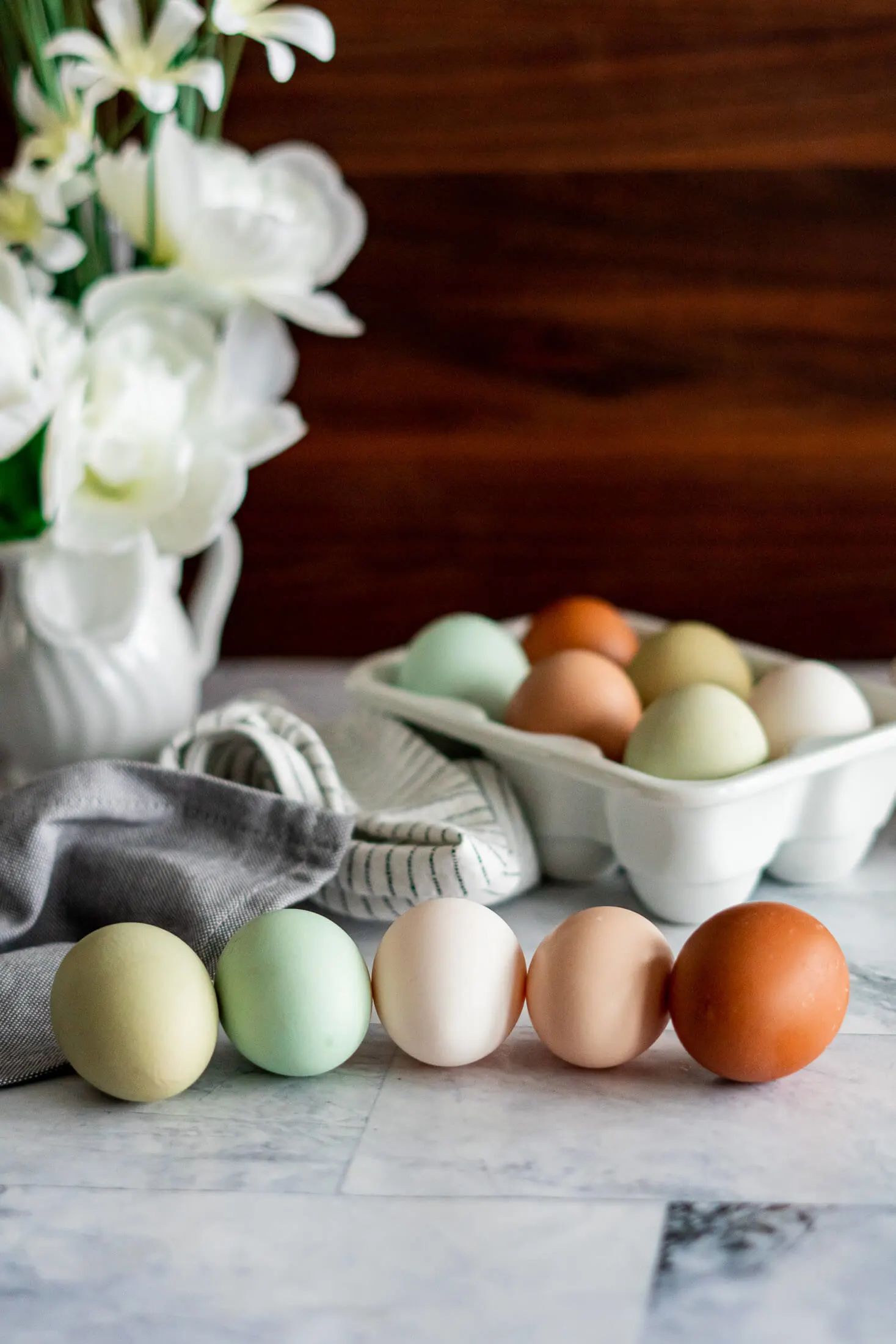
How To Wash Fresh Eggs
Washing fresh eggs is easy, the most important thing to remember is they need a hot shower, not a hot bath!
The water temperature must be higher than the egg temperature, according to the Alberta Government the wash water should be above 40 degrees C, generally somewhere between 90 and 120F is acceptable.
Don't soak the eggs in the hot water. Eggshells are porous and porous surfaces can absorb things from the environment, including dirty egg wash water. Keeping them under running water is fine, but don't fill a sink and allow them to rest in the water.
If the eggs are visibly dirty or have debris they can be scrubbed gently with a dedicated egg brush or clean cloth prior to washing says the CDC.
Once you're done washing, rinse the egg in clean running hot water, and place it on a clean kitchen towel to dry or dry with a clean kitchen towel before transferring to a clean container and placing in the fridge or using it immediately.
During the spring or other wet months when you don't have much of a choice in the matter because the girls get dirty either way, soiled eggs should be sanitized in a bleach water solution. 1 tablespoon of bleach to 1 gallon of hot water. To sanitize, dip the eggs in the bleach solution then rinse in hot water.
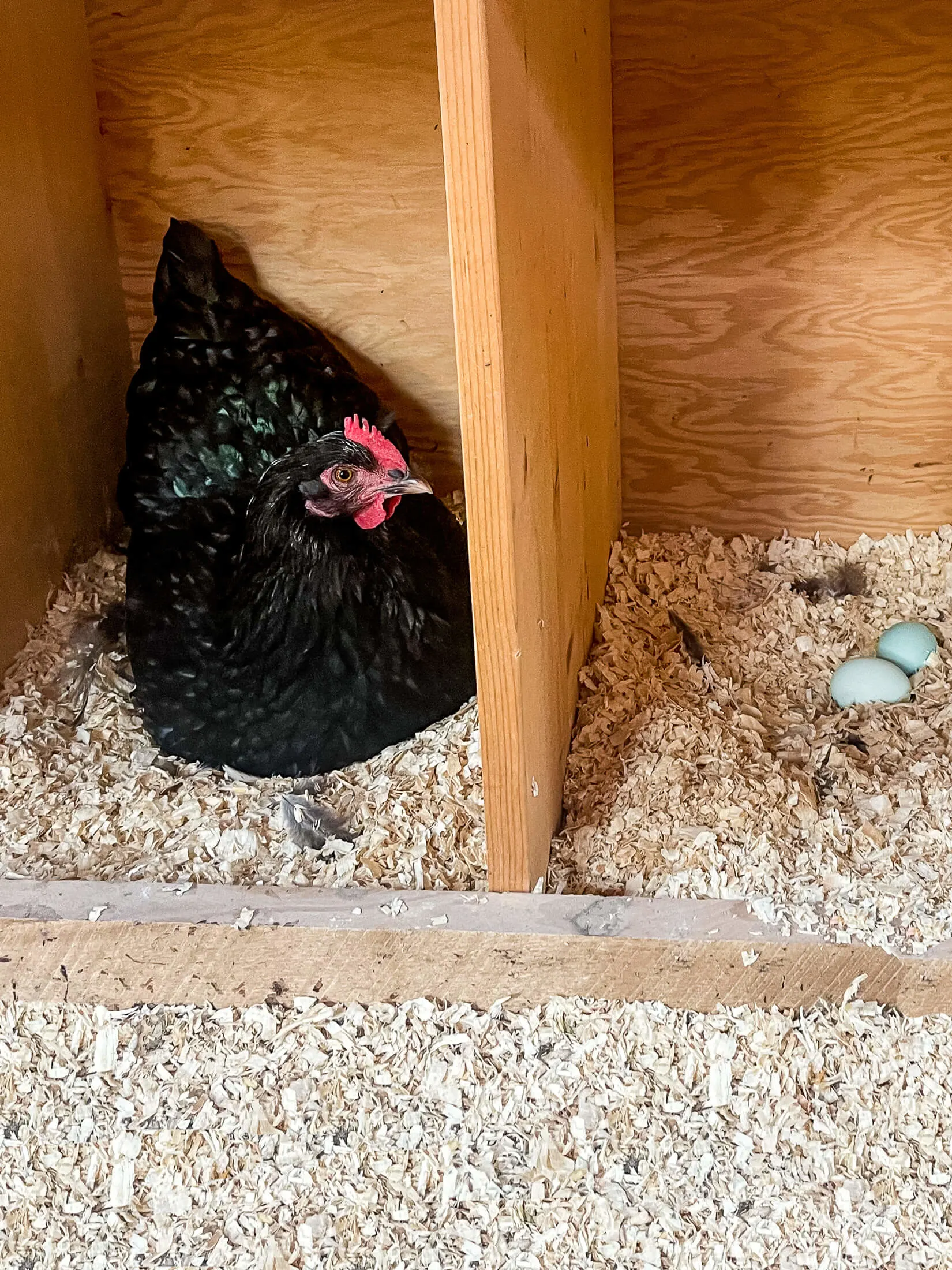
Egg Cleaning Tips
- Don't forget - eggs like a hot shower, not a hot bath! Cold water can actually cause the egg to contract and suck bacteria in. Warm water is debatable - personally, I measured my hot water straight from the tap and found it to be 115f, so I know I can safely use hot tap water to wash my eggs.
- Avoid abrupt temperature changes, especially cooling, as the contracting of the egg can actually pull bacteria into the egg through its pores.
- Collecting farm eggs in the winter presents its own challenges, especially if the weather is particularly cold. Some days, our eggs come into the house quite chilled - we allow them to slowly come to room temperature in an open container. If the container is closed, the cold egg creates condensation which can ruin the bloom on all eggs in the container. If you have an egg with condensation on it, it's best to wash and store it in the fridge as soon as you notice!
- You can use a specifically formulated egg cleaner to clean your eggs or small amounts of unscented dish soap - avoid scented cleaners as the egg could absorb some of the odors and affect the flavor.
- Washing does not render the egg free of the possibility of foodborne illness. It is important to fully cook ALL eggs to an internal temperature of 160F to kill salmonella bacteria.
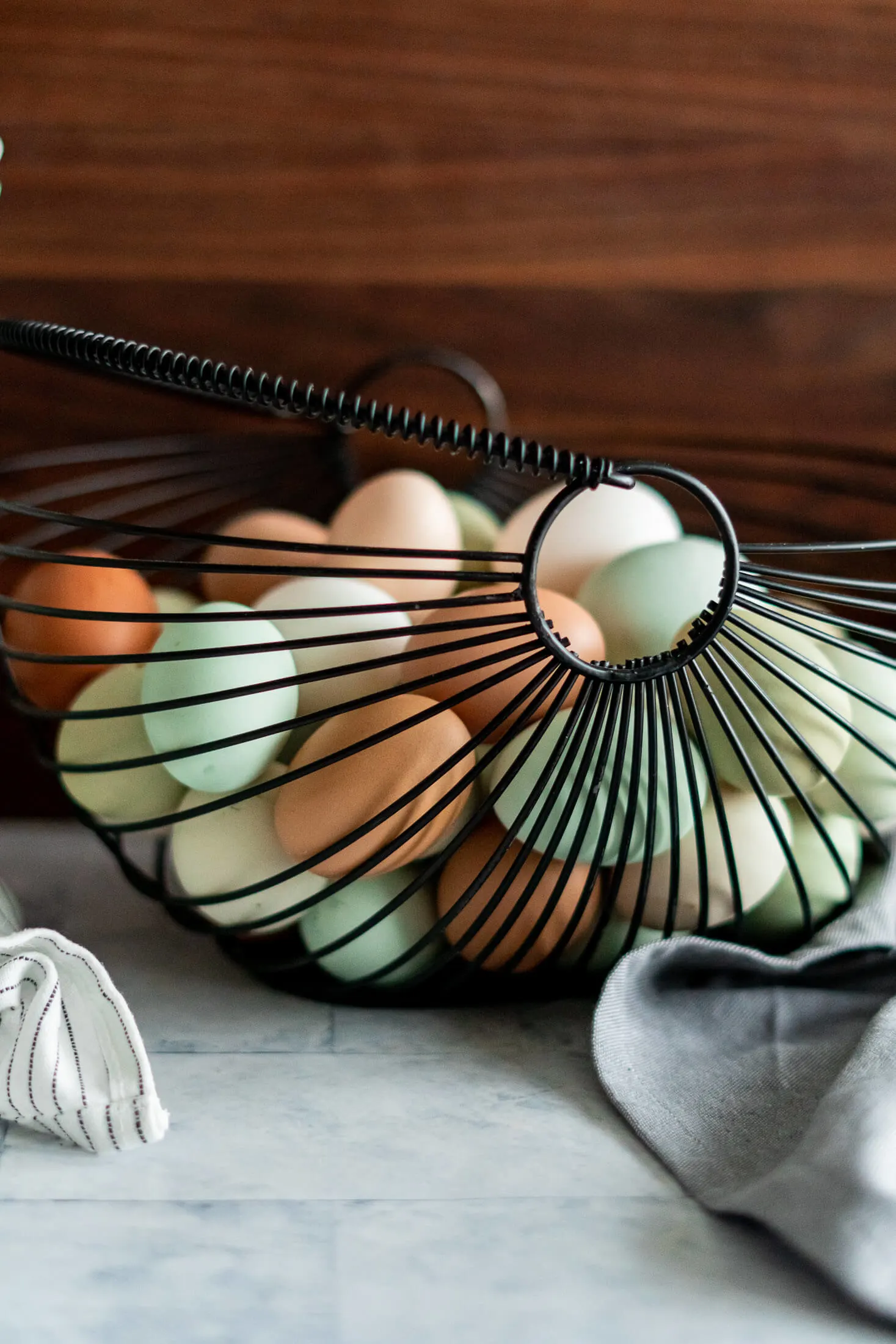
YouTube Fan? I have a great video on YouTube covering how to wash fresh eggs!
More Chicken Stuff!
How To Store Fresh Laid Eggs
When it comes to storing fresh eggs, you've got 2 main options.
Washed:
If you've washed your fresh eggs, they MUST be stored in the refrigerator. Once they've been in the fridge, they must remain in the fridge. The cooler temperatures help to slow the growth of any bacteria that may have been on the eggs and helps them to last longer.
Unwashed:
If you've left your fresh eggs unwashed, they can be stored at room temperature for up to 3 weeks. Again, this is only true if they are clean eggs with an intact bloom or cuticle.
If the temperature or humidity in your home is high, the shelf life of your eggs will be greatly reduced. They will lose freshness quicker in these conditions.
Regardless of whether you've washed your fresh eggs or left them unwashed, it's important to store them pointed end down. This keeps the yolk and the air sack separated and slows moisture loss from the egg. Keep the eggs in a carton or container that allows airflow.

Notes From The Homestead
Whether you wash or don't wash your eggs before storage will depend on your goals. Washing removes dirt, but also the cuticle or bloom which is a natural protective layer that helps to keep air and moisture in the egg.
Unwashed eggs can be stored at room temperature or in the fridge, while washed eggs must be stored in the fridge. Washed or unwashed, any refrigerated eggs must remain in the fridge until just prior to cooking.
Regardless of which side of the debate you fall on, it's best practice to gather the eggs multiple times daily, keep the coop and the nesting boxes clean, and use your best judgment on the safety of the eggs coming from your flock.
With proper storage, fresh eggs can last up to 15 weeks in the fridge and up to 3 weeks at room temperature. Enjoy your backyard egg harvest!
Obsessed With Chickens? Me Too. Read More:
- What Is Chicken Math?
- Homestead Coop Tour
- Winterizing Your Coop In Cold Climates
- Getting Started With Deep Litter Bedding
How To Wash Fresh Eggs
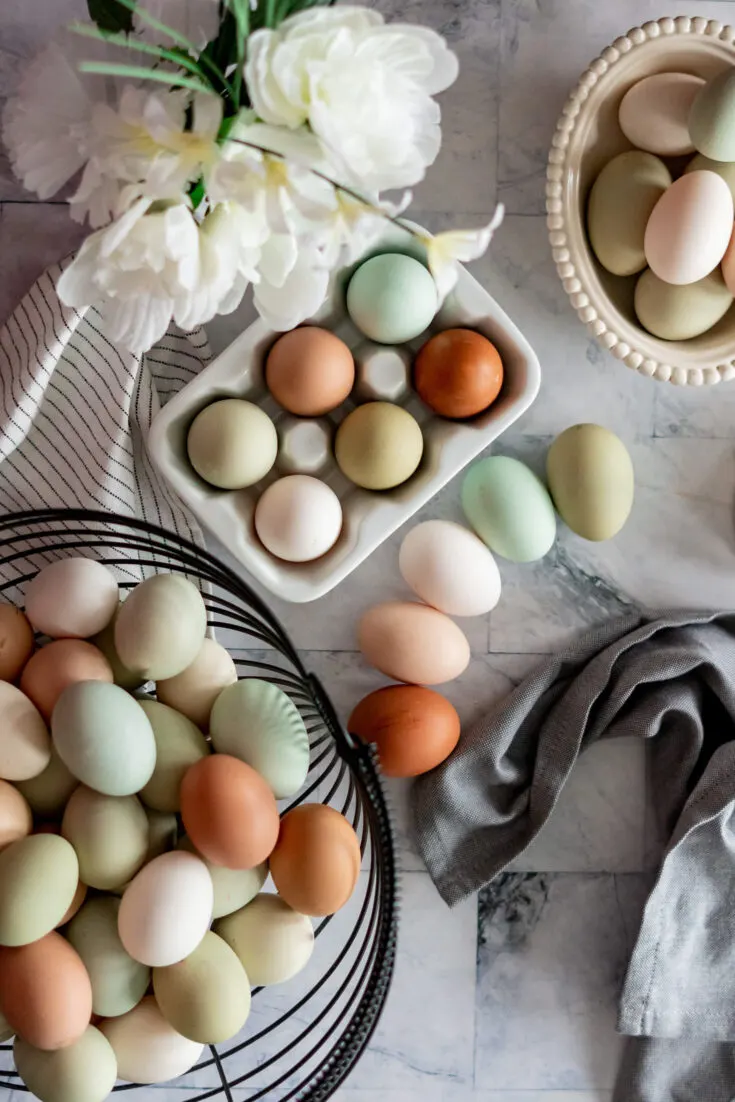
Fresh-gathered eggs from the farm are a nutritious and delicious way to start your day. But how do you make sure they're safe to eat? Follow these easy steps on how to wash farm eggs to ensure they're nice and clean before cooking them up!
Materials
- unwashed, freshly gathered farm fresh eggs
Tools
- bowl
- clean kitchen towel
- brush
Instructions
- Spread a clean kitchen towel on the counter.
- If the eggs were particularly dirty prior to washing, prepare a bleach solution by adding 1 tablespoon of bleach to 1 gallon of hot water in a large bowl.
- Gently scrub any eggs with debris, including nesting box material, bedding, feathers, and even dirt, using a soft egg brush or clean cloth.
- Run the hot water at your sink, then gently rub each egg under hot running water to remove unwanted dirt or bacteria.
- Dip the eggs into the bleach solution, then rinse in hot running water.
- Place rinsed eggs on a clean kitchen towel to dry.
- Once dry, transfer to a clean container with adequate airflow.
- Date each carton with the date collected.
- Store eggs in the fridge for up to 15 weeks.
Notes
- Don't forget - eggs like a hot shower, not a hot bath! Soaking eggs can allow dirty water into their pores. Cold water can actually cause the egg to contract and suck bacteria in through the pores.
- Avoid abrupt temperature changes, especially cooling, as the contracting of the egg can actually pull bacteria into the egg through its pores.
- Collecting farm eggs in the winter presents its own challenges, especially if the weather is particularly cold. Allow them to slowly come to room temperature in an open container. If the container is closed, the cold egg creates condensation which can ruin the bloom on all eggs in the container. If you have an egg with condensation on it, it's best to wash and store it in the fridge as soon as you notice.
- You can use a specifically formulated egg cleaner to clean your eggs or small amounts of unscented dish soap if desired - avoid scented cleaners as the egg could absorb some of the odors and affect the flavor.
- Washing does not render the egg free of the possibility of foodborne illness. It is important to fully cook ALL eggs to an internal temperature of 160F to kill salmonella bacteria.
Pin This How To Wash Farm Fresh Eggs Guide!
